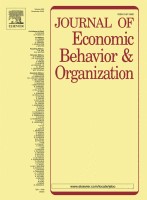Victor Klockmann, Alicia von Schenk, Marie Claire Villeval, 2022, Journal of Economic Behavior & Organization, 203, 284-317
Abstract:
In the future, artificially intelligent algorithms will make more and more decisions on behalf of humans that involve humans’ social preferences. They can learn these preferences through the repeated observation of human behavior in social encounters. In such a context, do individuals adjust the selfishness or prosociality of their behavior when it is common knowledge that their actions produce various externalities through the training of an algorithm? In an online experiment, we let participants’ choices in dictator games train an algorithm. Thereby, they create an externality on future decision making of an intelligent system that affects future participants. We show that individuals who are aware of the consequences of their training on the payoffs of a future generation behave more prosocially, but only when they bear the risk of being harmed themselves by future algorithmic choices. In that case, the externality of artificially intelligence training increases the share of egalitarian decisions in the present.
In the future, artificially intelligent algorithms will make more and more decisions on behalf of humans that involve humans’ social preferences. They can learn these preferences through the repeated observation of human behavior in social encounters. In such a context, do individuals adjust the selfishness or prosociality of their behavior when it is common knowledge that their actions produce various externalities through the training of an algorithm? In an online experiment, we let participants’ choices in dictator games train an algorithm. Thereby, they create an externality on future decision making of an intelligent system that affects future participants. We show that individuals who are aware of the consequences of their training on the payoffs of a future generation behave more prosocially, but only when they bear the risk of being harmed themselves by future algorithmic choices. In that case, the externality of artificially intelligence training increases the share of egalitarian decisions in the present.


